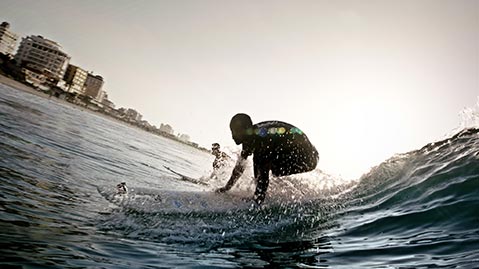Gaza Surf Club
Directors Philip Gnadt

As a surfer, there is an unsettling and awakening mental dissonance that sets in while watching Gaza Surf Club. On one hand, the bare bones stoke that the men and women featured in the film exude is as familiar as any you might encounter at a popular place like Rincon. On the other hand, there’s the unavoidable fact that these surfers are riding waves in the middle of a war-ravaged region and within a culture that does not respect their passion. See gazasurfclub-film.com.
Why does someone from Germany decide to make a surf film about the Gaza Strip?
Surfing is one of the ultimate expressions of personal freedom. And Gaza has been one of the most isolated regions in the world. So when I came across an article a couple of years back about surfers, in the then-number one conflict area of the Middle East, this incredible contrast sparked my interest immediately. It lead me to start thinking about a documentary with a different, a much more positive perspective of this painful and politicized conflict zone.
What surprised you most about the surfers you met?
Definitely the enthusiasm and pride of these surfers, as well as the rest of the population, and how they deal with walking through life in a region traumatized by war and isolation. The media tends to pay little attention to this speck on the Mediterranean coast unless bombs are falling. Between these sporadic wars, however, there is a “‘normal” life. Their will to keep going and pursuing their lives despite the bleak outlook is impressive to say the least. A good example is the fishermen grilling the few fish they catch over a fire on the beach and sharing it with us, which we also show in the film. It was the tastiest fish we’d had in years.
What challenges did filmmaking in Gaza present?
The planning to travel to the Gaza Strip requires some thorough research into how to enter the area at all. It is second only to North Korea as to how much it is blocked off from the outside world, with Israel in the north and east, Egypt on it’s southern border, and the Mediterranean Sea to the west.
Our producer Mickey Yamine grew up in Egypt, so it seemed to make sense to conduct a research trip via the Egyptian border with Gaza. As the political situation in Egypt changed shortly after our initial research, we looked into traveling via Israel. We received some major support from a fellow journalist in Tel Aviv into the bureaucracy of permits and press passes.
One bizarre challenge of planning the shoot was navigating around conflicts as we had to postpone twice due to tensions in the region and even a full-fledged war. We finally entered Gaza in late 2014 for a good six weeks, on foot and equipped with 19 pieces of luggage for our gear.
How is surfing regarded by the community at-large in Gaza?
To most people in Gaza, surfing is something kids do when they play in the water in summer (usually on boogie boards), but the sport on donated longboards has gotten some media attention in the last couple of years. The surfers are almost exclusively already working by the sea, either as fishermen or as lifeguards. It’s considered a playful hobby, somewhat of a pastime.
For men, it’s tolerated, but not necessarily supported. Women, however, have it a little harder: girls at a prepubescent age can usually play with the boys and even surf, if the father allows it, but it is frowned upon. Beyond puberty, the societal pressure is usually so strong and without a full Islamic cover usually also prohibited and enforced by the “moral police.”
Has Ibrahim (one of the main characters in the film) returned home yet? How do you think his surf crew/family feels about his absence?
We’re in touch with Ibrahim quite regularly via WhatsApp. He has chosen to stay in the U.S. a little longer and has managed to obtain a student visa and an academic opportunity in Texas. He wants to improve his English but says he has not turned his back on Gaza. He says returning home and building a clubhouse to support and further the surf community is still his dream. You’d think that his friends and crew – and even his family – would criticize his decision to stay in the U.S. rather than stick to his promise of returning with a bag full of hopes and dreams. But the situation in Gaza being what it is, they very much understand the ambiguity of “homesickness” and being “sick of home” inside what some have called the “largest open-air prison in the world”.
Has the mainstream surf industry had any reaction to the film?
We are reaching out to them as we travel to the international festivals and we have a couple of surf festivals also coming up. We screened the film at the Hawaii International Film Festival and Ibrahim managed to attend. We had women’s World Champion Carissa Moore attend the screening, who took a picture with him afterwards and took him to surf in Maui. We hope a few more will follow in support of this very isolated little surf community.



